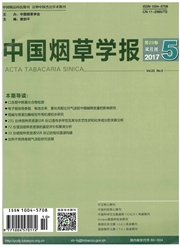

 中文摘要:
中文摘要:
通过分子生物学手段即根系差异蛋白质组学分析不同养地方式处理对烤烟生长的影响。结果表明,共有39个蛋白质表达丰度发生明显变化,LC-MS/MS成功鉴定24个差异蛋白质点。经生物信息学分析,其中22个蛋白质的功能得到鉴定,其中2个与香气有关的蛋白,转酮醇酶、GDP-甘露糖-3',5'-表异构酶(GME),这两个蛋白在稻草回田上调表达,有助于烟草品质提高,而紫云英处理下调表达,不利于品质提高。还鉴定到涉及多种信号转导、物质运输、蛋白质代谢、能量代谢等途径的蛋白,均对烟草生长发育起重要作用,这些酶在稻草回田处理和紫云英回田处理上调表达,促进烟草的生长,而在冬闲处理下调表达,生长较弱。研究结果显示,稻草回田有利于烟草的生长,有利于提高烟草产量和品质且经济效益较好。
 英文摘要:
英文摘要:
Root differential proteomics was employed to explore the impact of different soil management methods on growth of flue- cured tobacco (Nicotina tobaccum L). Results showed that a total 39 protein spots in tobacco root at late vigorous growing stage displayed significantly different expression as compared to control. 24 protein spots were identified by LC-MS/MS analysis and database searching. Among which, two proteins related to aroma formation, i.e. transketolase, GDP-mannose 3',5'-epimerase (GME) were up-regulated under treatment of rice straw returned to field (RS), which was helpful to enhance tobacco quality. While under AS treatment, they were down- regulated with reduced tobacco quality. Other proteins involved in signal transduction, translocation of solute, protein metabolism, and energy metabolism were also identified. They were very important for growth development and all up-regulated under both RS and AS treatments. While under WF treatment they were all down-regulated and thus tobacco growth was weak. In conclusion, RS treatment was in favour of boosting growth of tobacco, increasing yield and quality, and gaining better economic benefit.
 同期刊论文项目
同期刊论文项目
 同项目期刊论文
同项目期刊论文
 期刊信息
期刊信息
